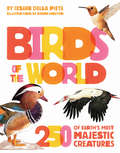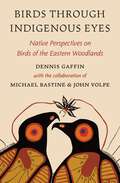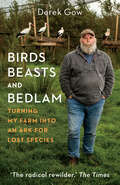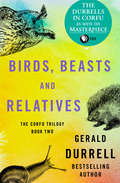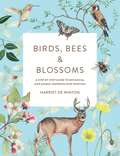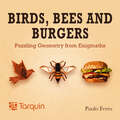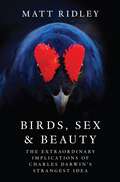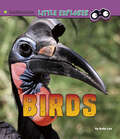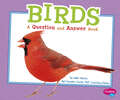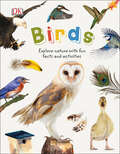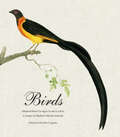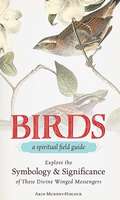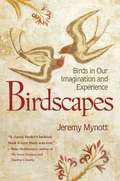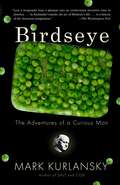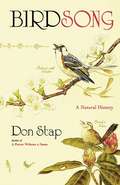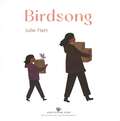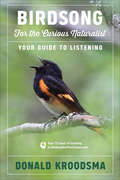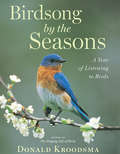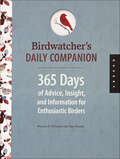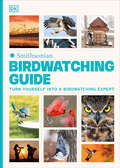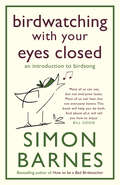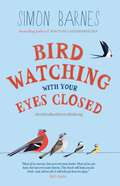- Table View
- List View
Birds of the World: 250 of Earth's Most Majestic Creatures
by Cesare Della PietàFrom owls and hawks to flamingos and toucans, this completely illustrated, fact-filled book features hundreds of avian wonders from all over the world for kids to discover and explore. This gorgeously illustrated book showcases the winged world of some of the most vibrant and unique birds. Approximately 10,000 different species of birds inhabit our planet, and they exist in all kinds of environments, from deserts to the Antarctic, from the open sea to impenetrable tropical forests, from swamps to mountaintops, to even cities and towns. This book offers young readers examples of the stunning variety of birds that live in our world -- from the largest ostrich at 5-feet tall and 330 pounds, to the smallest hummingbird at 2 inches long and weighing barely an ounce. Divided into chapters denoting geographical areas, Birds of the World features magnificent and detailed illustrations of each bird discussed. At the same time, captions summarize the most important aspects that make up a bird's life, such as environment, food, reproduction, and distinctive behavior. Kids will also learn about the varying colors of plumage, impressive courtship and mating displays, extraordinary flight skills, and more.
Birds through Indigenous Eyes: Native Perspectives on Birds of the Eastern Woodlands
by Dennis GaffinAn intimate and personal account of the profound roles birds play in the lives of some Indigenous peopleFor many hours over a period of years, white anthropologist Dennis Gaffin and two Indigenous friends, Michael Bastine and John Volpe, recorded their conversations about a shared passion: the birds of upstate New York and southern Ontario. In these lively, informal talks, Bastine (a healer and naturalist of Algonquin descent) and Volpe (a naturalist and animal rehabilitator of Ojibwe and Métis descent) shared their experiences of, and beliefs about, birds, describing the profound spiritual, psychological, and social roles of birds in the lives of some Indigenous people. Birds through Indigenous Eyes presents highlights of these conversations, placing them in context and showing how Native understandings of birds contrast with conventional Western views.Bastine and Volpe bring to life Algonquin, Ojibwe, and Haudenosaunee (Iroquois) beliefs about birds. They reveal how specific birds and bird species are seamlessly integrated into spirituality and everyday thought and action, how birds bring important messages to individual people, how a bird species can become associated with a person, and how birds provide warnings about our endangered environment. Over the course of the book, birds such as the house sparrow, Eastern phoebe, Northern flicker, belted kingfisher, gray catbird, cedar waxwing, and black-capped chickadee are shown in a new light—as spiritual and practical helpers that can teach humans how to live well.An original work of ethno-ornithology that offers a rare close-up look at some Native views on birds, Birds through Indigenous Eyes opens rich new perspectives on the deep connections between birds and humans.
Birds, Beasts and Bedlam: Turning My Farm into an Ark for Lost Species
by Derek Gow"Gow has a fire in his belly. We need more like him."—BBC Wildlife magazine "[Gow is] a wonderful storyteller, wisely allowing his animals (and considerable bedlam) to take center stage. His stories can be bawdy, laugh-out-loud funny, poignant, or even depressing, but they're never dull."—Booklist Birds, Beasts and Bedlam recounts the adventures of farmer-turned-rewilder Derek Gow, who is saving Britain’s much-loved but dangerously threatened species, from the water vole to beaver, wildcat to white stork, and tree frog to glow worm. Derek tells us all about the realities of rewilding; how he reared delicate roe deer and a sofa-loving wild boar piglet, moved a raging bison bull across the country, got bitten by a Scottish wildcat, returned honking skeins of graylag geese to the land and water that was once theirs, and restored the white stork to the Knepp Estate with Charlie Burrell and Isabella Tree. Derek’s first book, Bringing Back the Beaver, was a riotously funny and subversive account of his single-handed reintroduction of the beaver in Britain. Birds, Beasts and Bedlam, a natural successor to Gerald Durrell’s A Zoo in My Luggage, tells the story of Derek’s rewilding journey and his work to save many more species by transforming his Devon farm into a wildlife breeding center. He now houses beavers, white storks, water voles, lynx, wildcats, and harvest mice, with the aim of releasing them into the wild one day. Tearing down fences literally and metaphorically, Derek Gow is the one person with the character and strength of will to defy authority, bend the rules—and save our wildlife. "Gow reinvents what it means to be a guardian of the countryside."—The Guardian "The radical rewilder."—The Times "Derek Gow wants his farm to be a breeding colony, a seedbed for a denuded island."—The New Yorker
Birds, Beasts and Bedlam: Turning My Farm into an Ark for Lost Species
by Derek Gow&“Courageous, visionary, funny.&”—Isabella Tree&“One of the most remarkable figures in British conservation.&”—Observer&“Gow reinvents what it means to be a guardian of the countryside.&”—GuardianBirds, Beasts and Bedlam recounts the adventures of Britain&’s favorite maverick rewilder, Derek Gow, and his single-minded mission to save our rarest wildlife—one species at a time.Author of Bringing Back the Beaver and Hunt for the Shadow Wolf, Derek shares his personal, courageous, and highly entertaining tales in Birds, Beasts and Bedlam, including how he raised a sofa-loving wild boar piglet, transported a raging bison bull across the UK, got bitten by a Scottish wildcat, and, together with Isabella Tree and Charlie Burrell, restored the ancient white stork to the pioneering Knepp Estate.After a Shetland ewe captured his heart as a boy, Derek grew up to become a farmer with a passion for ancient breeds. When he realized how many of our species were close to extinction—even on his own land—Derek tore down fences literally and metaphorically, transforming his traditional Devon farm into a 300-acre rewilding haven for beavers, water voles, lynx, wildcats, harvest mice, wild boar, and more. A project that is still ongoing today.Birds, Beasts and Bedlam continues the rich tradition of great British nature writing. Passionate, subversive, and unforgettable, it will leave you inspired to support rewilding efforts around the world, in your community, and even in your backyard.&“A do-er, not a dreamer, Gow has become one of our most outspoken rewilders.&”—Countryfile Magazine&“In this warm and funny autobiography, [Gow] writes with a whimsical fluency about the moments of humour and pathos in an unusual life.&”—Country Life&“Gow has a fire in his belly. We need more like him.&”―BBC Wildlife magazine&“[Gow&’s] stories can be bawdy, laugh-out-loud funny, poignant, or even depressing, but they&’re never dull.&”―Booklist
Birds, Beasts and Relatives: My Family And Other Animals; Birds, Beasts And Relatives; And The Garden Of The Gods (The Corfu Trilogy #2)
by Gerald DurrellThe follow-up to My Family and Other Animals and the inspiration for The Durrells in Corfu: A naturalist&’s memoir of his family&’s time on a Greek island. In the years before World War II, Gerald Durrell&’s family left the gloomy shores of England for the sun-drenched island of Corfu. Against this picturesque backdrop, Durrell fondly recalls his family&’s disorderly household and outrageous antics, including their interactions with locals of both human and animal varieties. After a boyhood spent studying zoology and acquiring the island&’s exotic insects, reptiles, birds, mammals, and sea creatures as pets, Durrell&’s budding naturalism would later bloom into a passion for conservation that would last a lifetime. Filled with clever observations, amusing anecdotes, and childlike wonder, Birds, Beasts and Relatives is half nature guide, half coming-of-age tale, and all charmingly funny memoir. This ebook features an illustrated biography of Gerald Durrell including rare photos from the author&’s estate.
Birds, Bees & Blossoms: A step-by-step guide to botanical and animal watercolour painting
by Harriet De WintonIn her second book, botanical artist Harriet de Winton shows you how to paint modern watercolour artworks to treasure and share. Picking up where New Botanical Painting left off, this books aims to expand readers' repertoires into fauna as well as flora, with easy-to-follow instructions for a variety of difficulty levels.Through more than 30 step-by-step projects, you'll discover how to paint beautiful butterflies, bumblebees, birds and botanicals from around the world. In the final chapter, you'll find a guide to composing stunning patterns and scenes with your own botanical watercolour creations. Use your new skills to make art for your wall, unique cards, invitations, or simply paint for pleasure.Projects include: Bengal TigerChilean FlamingoPrickly PearZebraBumblebeeGarden Tiger MothPeacockWhite-tailed DeerPolar BearArctic PoppyAnd many more!
Birds, Bees and Burgers: Puzzling Geometry from EnigMaths
by Paulo FerroProblems are presented simply and colorfully, and solutions are well expounded and clear. The reader will enjoy the challenge, and the "aha" moment of understanding any solution that they did not come to themselves. Great fun—and enlightening, too!
Birds, Sex and Beauty: The Extraordinary Implications of Charles Darwin's Strangest Idea
by Matt Ridley“Matt Ridley is one of our finest science writers. This book is a treat for bird lovers and evolutionary biologists alike.” —Richard Dawkins, author of The Genetic Book of The Dead and The God DelusionThe New York Times bestselling author of Genome and The Evolution of Everything revisits Darwin’s revelatory theory of mate choice through the close study of the peculiar rituals of birds, and considers how this mating process complicates our own view of human evolution.In all animals, mating is a deal. But few creatures behave as if sex is a simple, even mutually beneficial, transaction. Many more treat it with reverence, suspicion, angst, and violence. In the case of the Black Grouse, the bird at the center of Matt Ridley’s investigation, the males dance and sing for hours a day, for several exhausting months, in an arduous and even deadly ritual called a “lek.” To prepare for the ordeal, they grow, preen and display fancy, twisted, bold-colored feathers. When achieved, consummation with a female takes seconds. So why the months of practice and preparation that is elaborate, extravagant, exhausting and elegant?The full answer remains a mystery. Evolutionary biologists can explain why males are generally the eager sellers, females the discriminating buyers. But they struggle to explain why, in some species, this extravagance goes beyond the mere gaudy, taking on bizarre shapes, postures, and behavior. And further, why these bird displays seem beautiful to us humans, a species with seemingly no skin in the game.Using an early morning “lek" as his starting point, Ridley explores the scientific research into the evolution of bright colors, exotic ornaments, and elaborate displays in birds around the world. Charles Darwin thought the purpose of such displays was to "charm" females. Though Darwin’s theory was initially dismissed and buried for decades, recent scientific research has proven him newly right—there is a powerful evolutionary force quite distinct from natural selection: mate choice. In Birds, Sex and Beauty, Ridley reopens the history of Darwin’s vexed theory, laying bare a century of disagreement about an idea so powerful, so weird, and so wonderful, we may have yet to fully understand its implications.
Birds: A 4d Book (Little Zoologist Ser.)
by Sally LeeDid you know that emus can run 31 miles per hour? Meet high-flying vultures, speedy emus, and other beautiful birds at the Smithsonian National Zoo in these first books reviewed by Smithsonian experts. Bring augmented reality to your students by downloading the free Capstone 4D app and scanning for access to awesome videos!
Birds: A Question And Answer Book (Animal Kingdom Questions And Answers Ser.)
by Isabel MartinClucking chickens? Tweeting cardinals? What does the word bird mean to you? What do they eat? Where do they live? Get answers to all these questions and find out just what makes a bird a bird!
Birds: Explore Nature with Fun Facts and Activities (Nature Explorers)
by DKHow does a bird make its nest? What do birds eat? Packed with facts and activities, this book has these answers and more, and is a perfect introduction to the world of our feathered friends for kids who are curious about nature.With amazing facts about fun topics like flight patterns and the hatching of eggs, Birds lets kids have fun and be innovative as they learn through simple activities like birdwatching and making a bird feeder. It includes information on birds of the sea, woodlands, desert, tropics, city, and beyond so kids can search the skies wherever they are.With its natural look and feel and its practical approach to learning, Birds is sure to help little explorers take flight.Series Overview: DK's revised Nature Explorers series is a fantastic first set of books on the great outdoors for children ages 6 to 8. From birds to weather to the seashore and more, the key topics of each subject are explained with plenty of fun activities to do along the way, encouraging kids to investigate and record everything they see. Fully updated with a contemporary design, DK's Nature Explorer series is perfect for kids who are curious about the world outside and want to discover nature.
Birds: Mini Archive (Cambridge Library Collection - Zoology Ser. #Volume 3)
by Georges-Louis LeclercThis lovely book showcases the delicate copper engravings of birds created by Georges-Louis Leclerc, Compte de Buffon (1707-88), for his masterpiece work Histoire naturelle, g#xC9;n#xC9;rale et particuli#xC8;re. The glorious birds captured within are original reproductions of Leclerc's art, which depicts the vibrant hues of the birds' feathers, the varying length of their wings, and their wide eyed expressions as they stand perched, always alert for symbols of danger or other forms of life that might serve as their next meal. Leclerc's original text from Histoire naturelle is also faithfully reproduced to provide descriptive information on the birds, such as their living locations and their unique physical characteristics. To bring this lovely book into the 21st century, the paperback format and low price make this rare and significant volume accessible and affordable. A DVD is also included with images of the birds to be used by readers at their discretion.
Birds: Nature's Magnificent Flying Machines
by Caroline ArnoldHovering, gliding, diving -- how do birds do it? Birds: Nature's Magnificent Flying Machines looks at how feathers, body structure, and wings vary from bird to bird. Readers will learn the mechanics of bird flight from takeoff to landing and discover how wing types meet the survival needs of each species. Popular science writer Caroline Arnold infuses this informative look at avian flight with her love of birds. Patricia J. Wynne's exquisitely detailed illustrations show these amazing creatures in action.
Birds: a spiritual field guide
by Arin Murphy-HiscockBirds are all around us#151;building nests for their eggs, perching on a nearby tree branch, floating freely on a breath of wind. But do you ever feel like a bird might be trying to connect with you#151;or even tell you something? This book can help you figure out the special message your visitor is trying to share. Inside this lovely illustrated field guide you'll find everything you need to decipher the unique meaning behind each individual bird sighting. From physical description to folklore, each of the common bird species detailed within has a story and a unique symbolism which will help reveal the changes these mystical creatures want you to make in your life. With this enlightening volume as your inspiration, get ready to take a look at your life from a bird's eye view#151;one robin, crow, and hummingbird at a time!
Birdscapes: Birds in Our Imagination and Experience (Princeton Shorts Ser.)
by Jeremy MynottWhat draws us to the beauty of a peacock, the flight of an eagle, or the song of a nightingale? Why are birds so significant in our lives and our sense of the world? And what do our ways of thinking about and experiencing birds tell us about ourselves? Birdscapes is a unique meditation on the variety of human responses to birds, from antiquity to today, and from casual observers to the globe-trotting "twitchers" who sometimes risk life, limb, and marriages simply to add new species to their "life lists." Drawing extensively on literature, history, philosophy, and science, Jeremy Mynott puts his own experiences as a birdwatcher in a rich cultural context. His sources range from the familiar--Thoreau, Keats, Darwin, and Audubon--to the unexpected--Benjamin Franklin, Giacomo Puccini, Oscar Wilde, and Monty Python. Just as unusual are the extensive illustrations, which explore our perceptions and representations of birds through images such as national emblems, women's hats, professional sports logos, and a Christmas biscuit tin, as well as classics of bird art. Each chapter takes up a new theme--from rarity, beauty, and sound to conservation, naming, and symbolism--and is set in a new place, as Mynott travels from his "home patch" in Suffolk, England, to his "away patch" in New York City's Central Park, as well as to Russia, Australia, and Greece. Conversational, playful, and witty, Birdscapes gently leads us to reflect on large questions about our relation to birds and the natural world. It encourages birders to see their pursuits in a broader human context--and it shows nonbirders what they may be missing.
Birdseye: The Adventures of a Curious Man
by Mark KurlanskyBreak out the TV dinners! From the author who gave us Cod, Salt, and other informative bestsellers, the first biography of Clarence Birdseye, the eccentric genius inventor whose fast-freezing process revolutionized the food industry and American agriculture.
Birdsong
by Don StapFollowing one of the world's experts on birdsong from the woods of Martha's Vineyard to the tropical forests of Central America, Don Stap brings to life the quest to unravel an ancient mystery: Why do birds sing and what do their songs mean? We quickly discover that one question leads to another. Why does the chestnut-sided warbler sing one song before dawn and another after sunrise? Why does the brown thrasher have a repertoire of two thousand songs when the chipping sparrow has only one? And how is the hermit thrush able to sing a duet with itself, producing two sounds simultaneously to create its beautiful, flutelike melody? Stap's lucid prose distills the complexities of the study of birdsong and unveils a remarkable discovery that sheds light on the mystery of mysteries: why young birds in the suborder oscines -- the "true songbirds" -- learn their songs but the closely related suboscines are born with their songs genetically encoded. As the story unfolds, Stap contemplates our enduring fascination with birdsong, from ancient pictographs and early Greek soothsayers, who knew that bird calls represented the voices of the gods, to the story of Mozart's pet starling. In a modern, noisy world, it is increasingly difficult to hear those voices of the gods. Exploring birdsong takes us to that rare place -- in danger of disappearing forever -- where one hears only the planet's oldest music.
Birdsong
by Julie FlettWhen Katherena and her mother move to a small town, Katherena feels lonely and out of place. But when she meets an elderly woman artist who lives next door, named Agnes - her world starts to change. Katherena and Agnes share the same passions for arts and crafts, birds, and nature. But as the seasons change, can Katherna navigate the failing health of her new friend?
Birdsong For The Curious Naturalist: Your Guide to Listening
by Donald KroodsmaBirdsong made easy to understand, lavishly illustrated with color photos, and accompanied by more than 700 online recordings From a leading expert, Birdsong for the Curious Naturalist is a basic, how-to guide that teaches anyone—from beginner to advanced birder—how to listen. In understandable and appealing language, Kroodsma explains why and how birds sing, what various calls mean, and what to listen for from the birds around us. The descriptions are accompanied by color photos of the birds, as well as QR codes that link to an online collection of more than 700 recordings. With these resources, readers are prepared to recognize bird sounds and the birds that make them. Kroodsma encourages readers to find the joy of birdsong and curiosity—to observe, listen intently, be curious, ask questions, and realize that many unanswered questions about birdsong don&’t have to rely on scientists for answers but can be answered by any curious naturalist.
Birdsong by the Seasons
by Donald KroodsmaBirdsong by the Seasons is a celebration of birdsong from January through December. The stories begin with a pileated woodpecker on New Year's Day; they unfold through the year, covering limpkins and scrub-jays in February in Florida, prairie birds in May, Scarlet Tanagers in July, and ending with a chorus of singing birds in Massachusetts just before Christmas. Readers get inside the mind of a scientist and see how answers only lead to more questions. Kroodsma provides a unique experience: with his gentle guidance, the pairing of sonagrams with the audio makes birdsong accessible and fascinating. Please note: this ebook includes embedded audio files. You will only be able to access these files from a device that supports embedded audio.
Birdwatcher's Daily Companion: 365 Days of Advice, Insight, and Information for Enthusiastic Birders
by Marcus H. Schneck Tom WarholA guide to bird species identification, habitats, feeding, finding and watching—the perfect gift for birding enthusiasts.Embrace your love of birdwatching, every day of the year! By nature, bird lovers are naturalists and collectors, and you know how easy it is to devote hours upon hours of time—a lifetime, in fact—to your hobby. Birdwatcher’s Daily Companion is a fun, sophisticated way to be newly inspired, every day of the year. Inside is insight into everything from how to identify look alike species to planting a hummingbird garden, planning birding travel, and so much more. Throughout the birdwatcher’s year, you’ll find: Mondays / bird-finding tips and techniques Tuesdays / all about species identification Wednesdays / ideas for birding excursions and travel Thursdays / learn to find and attract birds to your backyard Fridays / birds in history and mythology Saturdays & Sundays / birding projects and activities
Birdwatching Guide: Turn Yourself into a Birdwatching Expert (DK North American Bird Guides)
by DKGet inspired by nature on your birdwatching journeyStart your birdwatching journey in the safe hands of a lifelong birder. Through a series of chapters, you will build from an absolute beginner, exploring your own backyard, soaking up useful tips and insights gained from years of birdwatching.Whether you are in a city or deep in the country, birds are guaranteed and provide an easy doorway into nature. Learn where, when, and how to look and what to look out for. Find out what equipment to buy and how to use it. Discover the different characters and characteristics of birds—from the shy bittern to the bold robin and gymnastic red kite.As you build skills and experience, the book will help you expand horizons from walks with binoculars around your "local patch" to visiting remote wildlife reserves and other nature hot spots, with their contrasting birdlife and different demands, from dense woodland to expansive estuaries teeming with flocks of waders.
Birdwatching with Your Eyes Closed: An Introduction to Birdsong
by Simon BarnesAn introduction to birdsong, with enhanced features - audio samples etc.
Birdwatching with Your Eyes Closed: An Introduction to Birdsong
by Simon BarnesAn introduction to birdsong, with enhanced features - audio samples etc.
Birdwatching with Your Eyes Closed: An Introduction to Birdsong
by Simon Barnes"Most of us can see, but not everyone looks. Most of us can hear, but not everyone listens. This book will help you do both. And, above all, it will tell you how to enjoy." Bill Oddie"He'll tune your ears to winter's lonely voices - robins, wrens, long-tailed tits - before preparing you for the exultant sounds of spring." The TimesLearning to identify birdsong is not just a way to become a better bird-spotter. It is tuning in: a way of hearing the soundtrack of Planet Earth... Why do birds sing? What are they trying to say?Birdsong is not just about natural history. It is also about our history. We got melody from birds as we got rhythm from the womb. This vital book, with an accompanying podcast available online, takes you from winter into deepest spring, teaching you how to recognise song after song as the chorus swells. Beginning with the thin, soft song of the robin and ending with the life-affirming melody of nightingales. Along the way, you will learn the science of birdsong the difference between song and call, the physiology of songbirds, what birdsong tells us about evolution, and indeed the very beginnings of life itself. The aim is to give you a flying start in birdsong so that, after reading this book, you'll be listening to order, not chaos, to Bach, not white noise. You will be more aware of the wild world, and better able to understand it.
